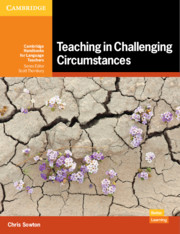Book contents
- Frontmatter
- Contents
- Thanks
- Acknowledgements
- Introduction
- I Creating a good environment for language learning
- II Being effective in the classroom
- III Teaching large classes
- IV Teaching language skills and systems
- V Teaching language without textbooks
- VI Teaching language with textbooks
- VII Helping students achieve their potential
- VIII Linking the school to the outside world
- IX Supporting yourself and others
- Glossary
- Index
31 - Reflecting on your own teaching
Published online by Cambridge University Press: 22 September 2021
- Frontmatter
- Contents
- Thanks
- Acknowledgements
- Introduction
- I Creating a good environment for language learning
- II Being effective in the classroom
- III Teaching large classes
- IV Teaching language skills and systems
- V Teaching language without textbooks
- VI Teaching language with textbooks
- VII Helping students achieve their potential
- VIII Linking the school to the outside world
- IX Supporting yourself and others
- Glossary
- Index
Summary
As a result of your reflection you may decide to do something in a different way. Or you may just decide that what you are doing is the best way. And that is what professional development is all about.
Julie TiceThe short version
1 Reflecting on your own teaching is an empowering process.
2 This process can help you manage some of the challenges you face on a daily basis, as well as identifying specific ways in which you can improve as a teacher.
3 In addition to reflection which can be done soon after a lesson, teachers can use Critical Incident Analysis to reflect more widely on significant teaching moments across their career.
4 A supportive school environment is one in which all educational stakeholders can give each other constructive feedback. This is difficult to achieve without trust.
5 Getting feedback on your teaching from a colleague can be very beneficial, especially if this can become systemic, and take place on a regular, ongoing basis.
Introduction
1 To what extent do you currently reflect on your own teaching? For example, do you:
• think about whether a lesson met its objectives?
• talk to a colleague about how a lesson went?
• make written notes or records about your teaching?
2 Have you ever been observed in the classroom? Think about:
• who did the observation;
• whether the process was supportive and constructive;
• any changes you made to your teaching following the observation.
Reflective teaching
In challenging circumstances, it may be difficult to access opportunities to improve your own teaching (see ▸Chapter 32 for ideas on how to do this). As such, it can be beneficial to look ‘inwards’ rather than ‘outwards’ for this support. You can learn a lot about your own teaching using a few simple processes. However, if you are able to involve colleagues and even your students in this process, this will add significantly to your development. Indeed, you can use these different perspectives to triangulate the feedback. For example, you may feel that your ▸boardwork isn't very clear and so it's difficult for students to read. If a colleague and your students give you similar feedback, then it's highly likely this is true, and you can make the necessary changes to your classroom practice.
- Type
- Chapter
- Information
- Teaching in Challenging Circumstances , pp. 182 - 185Publisher: Cambridge University PressPrint publication year: 2021



